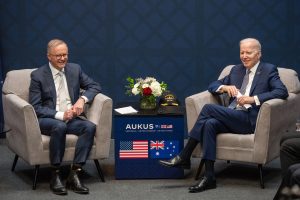This past week has seen considerable detail laid out for the AUKUS agreement between Australia, the United States, and the United Kingdom to provide a new fleet of nuclear-powered submarines to Australia. The agreement is generally understood as being a response to China’s massive military build-up, its persistent breaking of international law in the South China Sea, and its stated threat to absorb Taiwan into the People’s Republic by force.
While these were surely strong factors that have driven Australia’s calculations, there is one counterintuitive factor that may have been the strongest: What if AUKUS is less about China and more about the United States?
By this I don’t mean the tiresome commentary within Australia about Canberra being servile to U.S. interests. Instead, I mean that AUKUS could be a $245 billion investment in the maintenance of American norms; it’s perhaps a way to keep Washington engaged in the Indo-Pacific, and to create significant internal pressures that can counteract the forces of instability and strains of isolationism particularly within the Republican Party.
Despite the current presidency of Joe Biden, it must cause Australian policymakers many sleepless nights knowing that the threats to global liberal norms are not only emanating from Beijing, but also from powerful forces within the United States. There is an uneasy reality that Washington is both the bulwark of the status quo as well as a major threat to it.
Russia’s invasion of Ukraine has revealed that despite the Republican Party’s radicalism, there are still enough Republican members of Congress who can be relied upon to commit to globally important initiatives. However, the party’s two leading candidates for next year’s presidential election – Donald Trump and Ron DeSantis – have both publicly demonstrated suspicion toward these responsibilities, and a hyper-radicalized and vengeful Trump has expressed his desire to set fire to the entire bureaucracy and intelligence services should he return to the presidency.
AUKUS can therefore be deemed a calculated – but risky – bet that Trump won’t find his way back to the White House. But it is also a bet that someone like DeSantis can be restrained by systematic norms that Australia can contribute to. Australia may not have the weight to influence the United States at scale, but in a relatively normal political environment it does have the ability to contribute to the complex web of interests and pressures that drive Washington’s decision-making.
A major agreement like AUKUS gets enough actors in the United States invested in continued Indo-Pacific engagement in a way that can place upward pressure on the White House and Congress. As I have written previously, the open seas lanes within Northeast Asia are a critical national interest for Australia. Three of Australia’s four largest trading partners are in the region, and the overwhelming majority of this trade travels by ship. An invasion of Taiwan would be catastrophic for this trade, but even if this isn’t imminent, Beijing cannot be trusted to be the region’s security provider given its fondness for economic coercion as a diplomatic tool.
Australia’s deputy prime minister and defense minister, Richard Marles, highlighted that the new fleet of nuclear powered submarines is essential for maintaining open and secure sea lanes in Northeast Asia and the South China Sea. Even with this fleet Australia will obviously lack the capabilities to do this by itself. The fleet is designed to augment the U.S. presence in the region and the security contributions of other like minded states.
The conventional assessment of AUKUS is that it is part of a collective deterrence strategy to prevent Beijing from invading Taiwan. President Xi Jinping has signaled that he sees the absorption of Taiwan as part of his prospective legacy. While Xi may now be president for life, he will also be 70 years old this June, and approaching 80 by the time the first AUKUS submarines are delivered. His timeline may be more urgent than the tangible products of AUKUS are capable of keeping pace with.
However, as an agreement that influences Washington’s thinking, its outcomes are immediate and ongoing, and this may be the most consequential element of AUKUS. As a tool to maintain U.S. Indo-Pacific engagement and keep the vital sea lanes of both Northeast Asia and the South China Sea open and secure, AUKUS is an investment that will hopefully pay for itself.
Despite a general lack of national self-confidence, a demeanor of downplaying its capabilities, and a cynical belief that the country is simply a meek and servile follower of U.S. interests, Australia may be a more creative international actor than its commentariat gives it credit for. The AUKUS agreement could be seen as an indication that Australia is capable of being a shaper of outcomes, rather than just a responder to them.

































